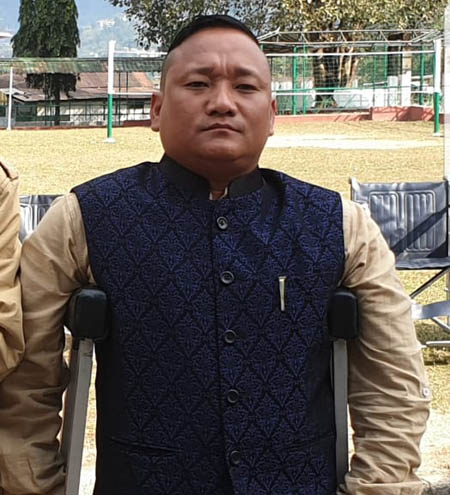Election-2019
[ Tongam Rina ]
ITANAGAR, Mar 29: Rojot Gaduk is the general secretary of the Arunachal Pradesh Paralympics Association (APPA). The 40-year-old stays in Itanagar but will go back to his village in Siang district to vote on 11 April to elect his parliamentary and legislative representatives.
His village, Gasheng, in Payum circle under Rumgong assembly constituency, requires two days of foot march from Molo, the nearest motorable point.
Gaduk, who is a persons with disability (PwD) advocate has mobility impairment, and therefore relies on a walking aid.
38-year-old Kongo Taku, who is the president of the APPA, has changed his constituency from 11 Seppa assembly constituency (AC) to 10 Seppa AC.
“Though my village is a few kilometres away from the district headquarters, it is not motorable and I had to rely on others to reach my village. Therefore I changed the constituency,” he says.
Taku says that for more than 500 PwD living in Itanagar, mostly with mobility issues, election is a trying time because of lack of motorable roads and facilities at the polling stations.
Gaduk and Taku are two voters from among 3770 who have been identified as PwD, out of the almost eight lakh voters in Arunachal Pradesh, by the Election Commission of India (ECI).
But accessibility is going to be a major issue not only for the PwD but also the poll officials.
According to Chief Electoral Officer (CEO) Kaling Tayeng, there are a total 2202 polling stations in the entire state, and 518 polling stations can only be reached by foot march.
With 81 polling stations, Anjaw district, bordering China, is one of the districts with the least road connectivity. Almost all the polling stations there require some amount of walking to reach.
According to DEO Dagbom Riba, three polling stations in the district will require three days’ foot march while 27 polling stations require two days’ foot march to reach.
The DEO says that of the 81 polling stations, which include 10 temporary structures, 43 will have ramps.
What is the scope for setting up ramps in these areas which take hours of trekking to reach?
The chances are very slim.
The great Indian jugaad had been in place earlier, but, worryingly, community halls and schools which are usually used as polling stations are not accessible for people who rely on walking aid, including wheelchairs, making Arunachal one of the most PwD-unfriendly states in the country.
In the absence of ramps, election officers have been forced to set up temporary ramps.
Arunachal East Parliamentary Constituency Returning Officer (RO) Prince Dhawan said all 35 stations under the Tezu AC would be wheelchair-accessible with the construction of ramps by 31 March.
He said that assured minimum facilities, including toilet and drinking water, would be made available at each of the polling stations in all the 35 stations.
According to the ECI, assured minimum facilities at polling stations include priority in voting, ramps, tactile signages, wheelchairs, accessible parking, and volunteers.
CEO Tayeng said polling stations which were on first floors have been shifted to ground floors. He said that in the district headquarters, the DCs have been asked to arrange transportation for the old and the PwD on poll day.
Papum Pare DEO Dr Joram Beda said there are 150 polling stations spread in three constituencies – Itanagar, Doimukh and Sagalee – of which five stations – three in Sagalee and two in Doimukh – are only accessible by foot.
Dr Beda said the situation could change if there are heavy rains.
Of the 150 stations, 94 do not have a ramp. Dr Beda said ramps would be installed at all the stations.
In Itanagar, there are 72 polling stations, but the abysmal status of inaccessibility is reflected in the capital area with 52 stations without ramps.
The Itanagar AC has the highest number of voters – more than 61,000.
The RO of Itanagar AC, Himanshu Gupta, said polling stations which do not have ramps have been identified, and that ramps would be set up at all the polling booths before the polls.
The journey is not going to be smooth for either the chief electoral office or the PwD with several stations requiring foot march to reach.
Arunachal has more than 29000 people with disability, of which 3200 have mobility issue.
Taku says the only way for the ECI to live up to its commitment that ‘no voter is left behind’ is to introduce postal ballot for the PwD.
The theme of the 2018 National Voters’ Day was ‘Accessible Elections’, with an aim to make the electoral process accessible to persons with disability. However, it seems like a mammoth task ahead in a state where something as mandatory as ramps for wheelchairs in government offices is not available, forcing the election offices across the state to come up with overnight ramps.
The state goes to simultaneous polls on 11 April.


